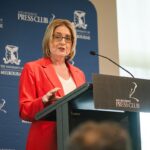Blog Post
10,000 Australians march in New South Wales to protest extreme abortion bill
By Jonathon Van Maren
Earlier this week, nearly 10,000 Australian pro-lifers took to the streets to protest an extreme abortion bill that the government of New South Wales is seeking to ramrod through the State Parliament. Here is a good summary of this rally, where up to 10,000 people marched to protest abortion. I asked one pro-lifer who is working hard on the ground, Steven Buhagiar, what is going on Down Under in the battle for life. Here is what he had to say:
What should the international pro-life community know about what is going on in Australia right now?
The government is attempting to rush through an extreme abortion Bill through the New South Wales State Parliament. They succeeded in passing the Bill through the Lower House of the NSW Parliament and are seeking to do the same through the Upper House. The Premier who supported and voted for the passage of the Bill through the lower house, is now back-pedalling due to mounting pressure from the conservative members of the Liberal Party which has only just been re-elected into government.
The issue of ‘abortion’ was not mentioned during the election campaign or that it would be one of the first issues to be addressed in the new parliament. It took the State by surprise as the Bill was put together in a stealth manner with the aim to have it passed through both houses in 3 days.
The archbishop of Sydney is calling it the ‘Kill Bill,’ as that is what it will do. The supporters of the Bill have sought to have this Bill passed with deceitful actions and have sought to bypass [correct] parliamentary process.
The people are mobilising. Last night [August 19] we held a rally which drew around 7000 people, who rallied outside Parliament house. Leaders of multiple faith traditions as well as parliamentary leaders spoke out against the Bill with a good sense of unity prevailing on the side of life. Right now we need the international pro-life community to join with us in prayerful solidarity. In Australia, we are enheartened by the support we receive from overseas friends in the pro-life community. This is especially true in light of the Cardinal Pell decision which is a good indicator of where our society is heading
What is the current status quo regarding abortion in Australia?
As a background, here is the current status of abortion laws through the states of Australia. We only have 7 States/ Territories.
New South Wales:
Abortion has been a criminal offence in New South Wales since 1900 and remains in the NSW criminal code today. Unlawfully procuring an abortion is punishable by up to 10 years’ imprisonment.
Last year a Bill determing a 150-metre “safe access” zone around abortion clinics was passed in NSW. The Bill also makes it an offence to film or photograph staff or patients, without their consent and also to pray outside an abortion clinic.
Victoria:
Abortion is legal in Victoria in the first 24 weeks of pregnancy. After 24 weeks, it is still legal, but requires the approval of two doctors. The doctors must agree it is in the patient’s best interests, based on her current and future physical, psychological, and social circumstances.
Abortion “buffer zone” laws passed in 2015 make it illegal for anti-abortion protesters to harass or film people within 150 metres of an abortion clinic.
Queensland:
22 weeks on request. 22 weeks to birth on a range of criteria including “social circumstances”.
Doctors with conscientious objection to abortion must refer anyway. No safeguards for women considering abortion (like counselling).
150 metre exclusion zone around abortion clinics. No provision to provide medical care for babies born alive in failed abortion procedures (babies left to die). No ban on partial birth abortions.
Tasmania:
Abortion is legal in Tasmania in the first 16 weeks of pregnancy. After 16 weeks, it is still legal, but requires the approval of two doctors.
In recent months, pressure has been mounting on the State Government to improve access to surgical abortions in Tasmania, after the closure of the state’s only dedicated abortion clinic in January.
Since abortions can only be provided in the state’s public health system in extraordinary circumstances (eg in cases of foetal abnormality), the vast majority of women who access pregnancy termination services do so through the private sector. There are very few health professionals currently providing termination services in Tasmania.
South Australia:
Abortion is legal up to 28 weeks in South Australia if two doctors agree a woman’s physical or mental health is endangered by pregnancy, or if there is a risk the child is likely to be born with a serious abnormality.
Abortions must be performed in a hospital (or prescribed facility) and the pregnant woman must be a resident of South Australia. In an emergency, these provisions may be waived.
Under South Australian law, a woman can still be charged for obtaining an “unlawful” abortion.
Western Australia:
Abortion is legal in Western Australia up to 20 weeks into pregnancy, though some restrictions apply.
Women must be given the opportunity to participate in counselling before a termination can be performed. Women under 16 years of age require one parent to be informed.
After 20 weeks, access to abortion is very restricted. A woman must receive approval from two doctors from a statutory panel of six (appointed by the Health Minister) who agree the woman, or her foetus, has a “severe medical condition” that justifies the procedure.
The procedure can then only go ahead in a medical facility approved by the Minister.
Australian Capital Territory:
Abortion is legal in the ACT, but it must be provided by a medical doctor in an approved medical facility.
The ACT Greens have recently pushed for women in Canberra to be able to order abortion drugs over the phone or through their GP to have at-home medical abortions. In the ACT, protest-free “privacy zones” were introduced in 2015, making it an offence to protest within 50 metres of an abortion clinic.
Northern Territory:
Abortion is legal in the Northern Territory up to 23 weeks of pregnancy with the approval of medical practitioners. For terminations up to 14 weeks, assessment by one doctor is required. After 14 weeks, approval from two doctors is required. Beyond 23 weeks gestation, the Pregnancy Law Reform Act stipulates that a pregnant woman’s life must be endangered for a pregnancy to be terminated.
What is public opinion on abortion like?
From a Galaxy Poll conducted April 2017, with results still most valid:
Most voters in New South Wales (56%) believe that an unborn child at 23 weeks of pregnancy is a person with human rights. Those who agree are more than double those who disagree (24%). A significant proportion of voters (20%) is undecided. This view is most commonly held by women and 18 to 34-yearolds (both 60%).
It is widely accepted by 81% of NSW voters that abortion can harm the mental and/or physical health of a woman. Females (83%) and those aged 18-34 years (84%) are the most likely to have concerns about the harm done by abortion.
More than one-quarter (26%) of NSW voters personally know at least one woman who has been pressured to have an abortion. 19% know one woman and 7% know two or more women who have experienced coercion. 29% of females and 30% of 35 to 49-year-olds know at least one woman who was in this situation.
More NSW voters (46%) support abortion for non-medical reasons than oppose (35%), but 19% are unsure – so there is no consensus on this question. This view is most commonly held by women (47%) and 18 to 34-year-olds (50%).
Half of the voters in NSW would not allow abortion after 8 weeks of pregnancy. This includes 15% who would not allow abortion after 5 weeks and 22% opposed to abortion at any time. 60% of NSW voters would not allow abortion after 13 weeks, 68% after 16 weeks, and 74% after 23 weeks. Only 5% support abortion at any time until birth. Women are most supportive of early gestational limits on abortion, with 66% of females opposed to abortion after 13 weeks.
There is widespread belief in NSW (90%) that before having an abortion a woman should have the right to receive independent counselling so that she can make a fully informed decision. Only 4% disagree.
Almost everyone in NSW (93%) believes that women should have the right to be fully informed of the risks of abortion and the support available to continue with the pregnancy. Just 3% disagree.
There is also strong support (80%) for a cooling-off period of several days between making an appointment for an abortion and the actual procedure. Only 10% disagree.
Almost two-thirds (65%) of NSW voters believe parental consent should normally be required for girls under the age of 16 to have an abortion. Support is strongest in the 50+ age group, with 70% agreement. Just 22% of all voters disagree.
Almost two-thirds (61%) of NSW voters support conscientious objection provisions allowing doctors and nurses to opt out of performing or participating in abortions. 17% are opposed, while 21% are unsure.
There is strong opposition to sex-selective abortion in NSW, with 83% of voters against this practice. Only 8% are in favour. Women (86%) and the 50+ age group (90%) are most opposed. Under the current law over 25,000 abortions are performed each year in New South Wales.
More than one-third (35%) of NSW voters would be less likely to vote for their MP if he or she voted in Parliament for decriminalisation of abortion. 19% would be more likely to vote for their MP in that case, while 15% were unsure and 31% took the position that the issue would not influence their vote at the next State election. This suggests a potential average swing of 8% against MPs who would vote for decriminalisation of abortion.
What can pro-lifers do to respond to what is happening?
We are using a Pray, Act, and Witness strategy.
We have a three week gap before the vote in the Upper House:
Pray
Archbishop Anthony Fisher of Sydney said last night that we must continue to pray and fast that ‘God Power’ will convert hearts especially those in Parliament who will vote on this Bill and those who hold positions of influence and leadership. We can continue to pray personally in solidarity with the Archbishop’s request as well as organise parish based prayer such as eucharistic adoration and the public recitation of the rosary.
Act
Bombard the Upper House members with emails, calls and on site visits to express our opposition to this barbaric Bill. Lower House member and former Minister for Women Tanya Davies have said that we must act with respect but with courage. She said to especially let the Premier know that this is a Bill we wholeheartedly reject. This is not what the people of NSW want or will accept.
Also, we must send in any outstanding petition signatures that we have collected. To date, 70,000 petition signatures against the Bill have been collected and will be tabled ion the floor of the NSW Upper House.
Witness
Continue to witness publicly outside the NSW Parliament House and join is with the upcoming rallies which will take place again as the Upper House members prepare to vote on this Bill in three weeks time.
Is there anything else you’d like to add?
Public opposition to this Bill is fundamental as NSW is the last bastion against the onslaught of anti-life legislation which is plaguing Australia at this time.
It is essential that the people rise up in numbers against this Bill and to place ever mounting pressure on the members of Parliament that they in fact work for us, not us for them. They are meant to work for the good of society and not for its moral downfall.
If we don’t stand for this now, we must know that the anti-life legislation will not stop.
Euthanasia is around the corner and radical gender ideology will increasingly be foisted on our children.
We need to truly become in action, the pro-life generation.








